Faculty Spotlight: Dr. Belinda Borrelli appointed to National Advisory Dental and Craniofacial Research Council
Dr. Belinda Borrelli, professor of health policy & health services research and director of GSDM’s Center for Behavioral Sciences Research, was appointed in January 2025 to serve a three-year term on the National Advisory Dental and Craniofacial Research Council (NADCR).
NADCR is responsible for making recommendations to the director of the National Institute of Dental and Craniofacial Research (NIDCR) and the Health and Human Services secretary on matters relating to the Institute, including reviewing and recommending grant applications for funding, developing and/or approving research initiatives, and advising on training and career development supported by the institute. The NADCR also reviews NIDCR scientific program priorities and program balance, and research conducted by the Division of Intramural Research.

Borrelli said she is excited to work with fellow dental colleagues on how to best develop the future of dental and craniofacial research.
“[My priorities are to] maintain and continue scientifically rigorous methods, not only in terms of outcomes, but also mechanisms research while thinking creatively and innovatively about how to solve the most vexing research questions in oral health to improve public health,” Borrelli said.
Borrelli is a clinical psychologist specializing in motivating health behavior change. Her research has focused on developing and testing treatments to motivate smoking cessation, prevent vaping, and improve oral health and dietary behaviors, as well as promoting adherence to medications and treatment regimens for chronic diseases.
“Being a behavioral scientist, [I’m] being the voice of [how] the mouth is connected to both body and brain and our cognitions and motivation. Borrelli said. “You could have dental treatments that are a hundred percent effective, but if nobody adopts them, then they’re zero percent effective.”